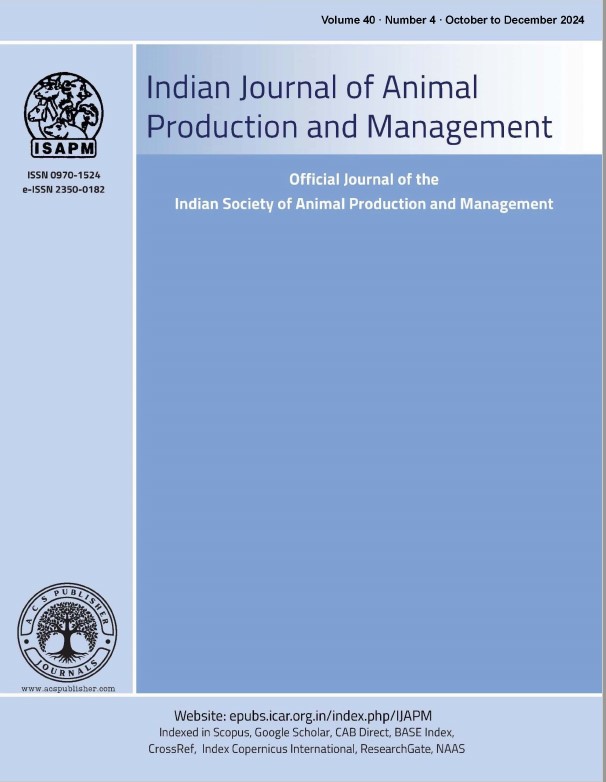Effect of Stray and High Voltage Exposure on Livestock: An Overview
DOI:
https://doi.org/10.48165/ijapm.2024.40.1.1Keywords:
stray voltage, electrical exposure, mastitis, somatic cell countAbstract
Electricity is essential to dairy farming and electrically powered machines are used for milking, automatic feed dispensers and heated water bowls. Leakage of current from these equipments, high voltage lines or faulty connections between the electrical circuit and the earth can lead to an undesirable electrical phenomenon called stray voltage. Stray voltage is a small voltage (<10V) that can be measured between two possible contact points. Cows can sense voltages at approximately one-tenth of a human being. Humans have inherently higher body resistance than cows and generally have shoes or boots while working in barns, which further increases resistance. Consequently, humans do not feel what animals feel. Stray voltages less than 0.5 volts are considered normal. Stray voltages vary, depending on the circuits used and the amount of moisture in the soil around the grounding rod. Impact of stray currents on livestock at current 1 - 3 mA: At current 4 - 6 mA: common behavioral response such as flinching or delaying drinking water. At current > 6 mA (up to 10): Feed intake is reduced, resulting in lower meat and milk production. Common symptoms of stray voltage in cows include hesitation to enter the parlor, they may stampede or rush out of the parlor when released, cows dance or step around constantly while in the milking parlor, Normal milk letdown is interrupted, Increased milking time, Udder irritation caused by residual milk and increased somatic cell count which increases the incidence of mastitis.
References
Appleman, R. D. and Cloud, H. A. (1980). Stray voltage problems with dairy cows. University of Minnesota Extension. https://core.ac.uk/download/pdf/224770412.pdf.
Accessed on May 05, 2022.
Aneshansley D. J. and Price L. R. (1992). Effects of voltages on cows over a complete lactation: 1, milk yield and composition. J. Dairy Sci.; 75:2719–25
Churchward, R. E. (1948). A note on the occurrence of electrical shocks from milking machines and their possible effects on mastitis. Aust. Vet. J.24:150.
Craine, L. B. (1975). Effects on mammals of grounded neutral voltages from distribution power lines. Inst. Elec. Eng.75-303.
Craine, L. B., Ehlers, M. H. and. Nelson, D. K. (1970). Electric potentials and domestic water supplies. Agric. Eng. 51:415.
Craine, L. B., Betts, A. L. and Greenfield, E. W. (1969). Electrical ground currents in Clark County. Div. Ind. Res., Washington State Univ., Res. Rep. No. 69/16-5.
Dorr, D. (2009). Determining voltage levels of concern for human and animal response to AC current. IEEE Power & Energy Society General Meeting (pp. 1-6).
Drenkard, D. H., Gorewit, R. C., Scott, N. R., & Sagi, R. (1985). Milk production, health, behavior, and endocrine responses of cows exposed to electrical current during milking. Journal of Dairy Science, 68(10), 2694-2702.
Feistman, G. J., and White, R. R. (1975). Tingle voltages in milking parlors. Br. Columbia Dep. Agric. Eng. Notes: 324:5.
Gorewit, R. C., N. R. Scott, and C. S. Czarniecki.1984. Responses of dairy cows to alternating electrical current administered semi randomly in anon avoidance environment. J. Dairy Sci. 68:718.
Gustafson, Robert J., and Mark T. Morgan. (2004). Stray Voltage Problems in Agriculture. Chapter
in Fundamentals of Electricity for Agriculture, 4rd edition, 431-451. St. Joseph, Michigan: ASAE. © American Society of Agricultural Engineers.
Henke, D. V., Gorewit, R. C., Scott, N. R. and Sagi. R. (1985). Milk production, health, behavior, and endocrine responses of cows exposed to electrical current during milking. J. Dairy Sci.68(10): 2694–702.
Islam, F. R., Prasad, R., Haque R. and Sharma, V. (2020). Impact of Stray Voltage on Renewable Energy-based Farm in Pacific Island Country. Indonesian Journal of Electrical Engineering and Informatics (IJEEI), 8(4): 795-
Janzen, E. D. (2020). Lighting Stroke and Electrocution in Animals, MSD Veterinary Mannual, Accessed on June 06, 2022. www.msdvetmanual.com/generalized
conditions/lightning-stroke-and
electrocution/lightning-stroke-and-electrocution in-animals.
Lefcourt, A. M. and Akers, R. M. (1982). Endocrine responses of cows subjected to controlled voltages during milking. Journal of Dairy Science, 65(11): 2125-2130.
Lefcourt, A. M., Akers, R. M., Miller, R. H. and Weinland, B. (1985). Effects of intermittent electrical shock on responses related to milk ejection. J. Dairy Sci. 68:391.
Lefcourt, A. (1991). Effects of electrical voltage/current on farm animals: How to detect and remedy problems. USDA Agriculture Handbook No. 696. Washington, D.C.: U.S. Government Printing Office.
Majerus, O. L., Martin, R. O. & Peterson, R. A. (1985). Stray voltage: Proceedings of the national stray voltage symposium, Oct. 10-12, 1984, Syracuse, NY. ASAE, Pub. 3-85, ASAE, St. Joseph, MI 49085.
Nackers, M. (2000). Stray voltage symptoms common in dairy cattle eliminated by on-farm neutral isolation. University of Wisconsin-Stout, Menomonie, Wisconsin.
Norell, R. J., Gustafson, R. J., Appleman, R. D. and Overmier, J. B. (1983). Behavioral studies of dairy cattle sensitivity to electrical currents. Trans. Am. Soc. Agric. Eng. 26:1506.
Phillips, D.S.M. (1962). Production of cows may be affected by small electric shocks from milking plants. N.Z. J. Agric. 105:221.
Reinemann, D. J. (2021). Stray Voltage in Animal Housing Management and Nutrition, MSD Veterinary Manual. https://www.msdvetmanual.com/management
and-nutrition/stray-voltage-in-animal
housing/stray-voltage-in-animal-housing. Accessed on May 05, 2022.
Reinemann D. J. (2009). What do we about stray voltage? Accessed on April 27, 2022. https://www.wpr.org/sites/default/files/10%20DJ R%20What%20do%20we%20know%20about %20Stray%20Voltage%202010.pdf
Rigalma, K., Duvaux-Ponter, C., Barrier, A., Charles, C., Ponter, A. A., Deschamps, F. and Roussel, S. (2010). Medium-term effects of repeated exposure to stray voltage on activity, stress physiology, and milk production and composition in dairy cows. Journal of dairy science, 93(8): 3542-3552.
Schulze, C., Peters, M., Baumgartner, W. and Wohlsein, P. (2016). Electrical injuries in animals: causes, pathogenesis, and morphological findings. Veterinary pathology, 53(5): 1018-1029.
Tufani, N. A., Singh, J. L. and Bhagat, L. (2015). Therapeutic Management of Electrocution in A Rhesus Monkey. Journal of Wildlife Research, 3(3): 27-29.
Watson, J. A., Bucklin, R. A. and Bray, D. R. (2019). Stray Voltages in Dairies. EDIS, AE55 Department of Agricultural and Biological Engineering, https://edis.ifas.ufl.edu/
Whittlestone, W. G., Mullord, M. M., Kilgour, R. and Cate. L. R. (1975). Electric shocks during machine milking. N.Z. Vet. J. 23:105.

